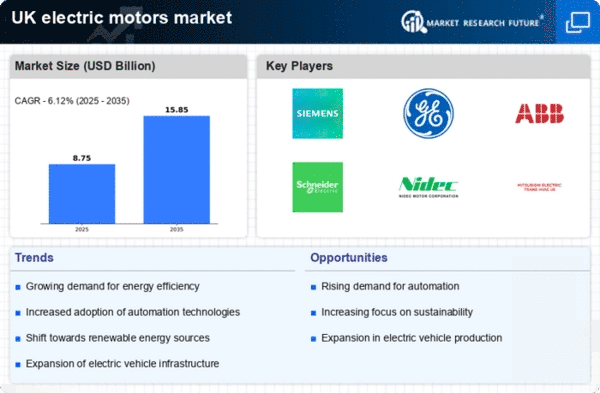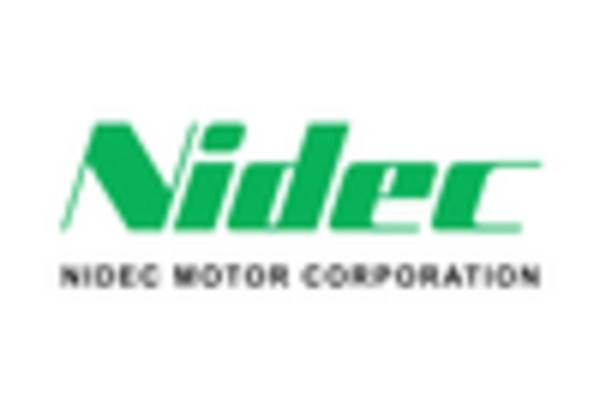Rising Demand for Automation
The market in the UK is experiencing a notable surge in demand for automation across various sectors, including manufacturing and logistics. This trend is driven by the need for increased efficiency and productivity. As industries seek to reduce operational costs, the adoption of automated systems that utilize electric motors is becoming more prevalent. According to recent data, the automation sector is projected to grow at a CAGR of approximately 8% over the next five years, which directly influences the electric motors market. The integration of electric motors in automated machinery not only enhances performance but also contributes to energy savings, aligning with sustainability goals. Consequently, this rising demand for automation is a significant driver for the electric motors market, as companies invest in advanced technologies to remain competitive.
Expansion of Renewable Energy Sources
The expansion of renewable energy sources in the UK is significantly influencing the electric motors market. As the country increases its reliance on wind, solar, and hydroelectric power, the demand for electric motors in these applications is expected to rise. Electric motors are integral to the operation of renewable energy systems, such as wind turbines and solar tracking systems. Recent statistics indicate that the renewable energy sector is projected to grow by 20% annually, which directly correlates with the increasing need for efficient electric motors. This growth not only supports the transition to cleaner energy but also drives innovation within the electric motors market, as manufacturers develop specialized motors tailored for renewable applications. Consequently, the expansion of renewable energy sources serves as a vital driver for the electric motors market.
Government Initiatives for Sustainability
In the UK, government initiatives aimed at promoting sustainability are significantly impacting the electric motors market. The government has set ambitious targets to reduce carbon emissions, which has led to increased investments in energy-efficient technologies. For instance, the UK aims to achieve net-zero emissions by 2050, prompting industries to transition towards greener solutions. Electric motors, known for their efficiency and lower environmental impact, are at the forefront of this transition. Recent reports indicate that the market for energy-efficient electric motors is expected to grow by 15% annually, driven by regulatory support and incentives. These initiatives not only encourage the adoption of electric motors but also foster innovation within the industry, making sustainability a key driver for the electric motors market.
Technological Advancements in Motor Design
Technological advancements in motor design are playing a crucial role in shaping the electric motors market in the UK. Innovations such as improved materials, enhanced cooling techniques, and advanced control systems are leading to the development of more efficient and reliable electric motors. These advancements are particularly relevant in sectors like renewable energy and industrial automation, where performance and efficiency are paramount. The introduction of smart motors, which can communicate with other devices and systems, is also gaining traction. As a result, the electric motors market is projected to witness a growth rate of around 12% over the next few years, driven by these technological improvements. This focus on innovation not only enhances the capabilities of electric motors but also positions them as essential components in various applications.
Growth in Electric and Hybrid Vehicle Production
The growth in electric and hybrid vehicle production in the UK is emerging as a significant driver for the electric motors market. With the automotive industry undergoing a transformation towards electrification, the demand for electric motors is surging. Major automotive manufacturers are investing heavily in electric vehicle (EV) technology, with projections indicating that EV sales could account for over 30% of total vehicle sales by 2030. This shift not only boosts the electric motors market but also encourages advancements in motor technology to meet the specific requirements of electric and hybrid vehicles. The integration of high-performance electric motors in these vehicles is essential for enhancing efficiency and driving range. As a result, the growth in electric and hybrid vehicle production is likely to propel the electric motors market forward, creating new opportunities for manufacturers and suppliers.
















